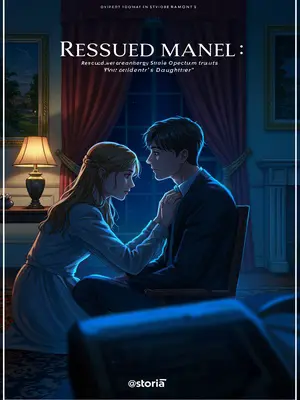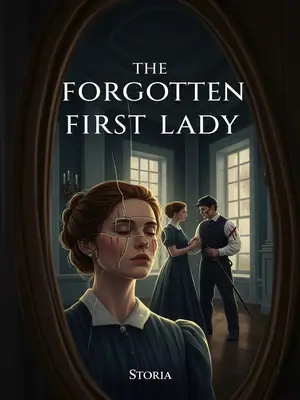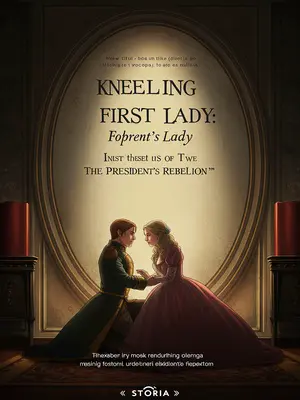Chapter 1: The Mistress Summoned to the White House
When my childhood friend arrived in this world, I’d already spent three years as the mistress at the Whitmore family’s estate.
It’s funny, looking back now—how three years can disappear when you’re living under someone else’s roof, going by someone else’s name, always glancing over your shoulder. Even the old wooden banister by the stairs would creak at me, like it had opinions about who belonged here. I’d trained myself to tread lightly, to keep my voice low. Sometimes I’d think, Keep it down, or the whole house will hear.
Word was, ever since the President almost drowned in the Potomac, he wasn’t the same guy anymore.
In D.C., stories never die. Some folks said he was as good as dead—blue-lipped and limp on the riverbank—until the Secret Service dragged him back. After that, he just wasn’t himself. They talked about it everywhere—from the polished corridors of Capitol Hill to the battered stools at Ben’s Chili Bowl.
He put his faith in science and education, rooted out corruption like it was a personal vendetta, and toppled political dynasties all over Washington.
He’d shut down an entire agency before breakfast—then, by lunchtime, he’d be on TV talking about STEM grants. Old families who thought they ran this city? Suddenly, they were on the outside looking in. Honestly, you could see it on their faces. It was the kind of shakeup that had everyone—lobbyists, senators, even the doormen—wondering if their world was about to collapse. Nobody felt safe.
Then came Thanksgiving. The President caught a glimpse of me—and the next day, he issued an executive order, having me brought to the White House and naming me First Lady.
By noon, it was everywhere. Cable news anchors lost their minds, and the society pages couldn’t get enough. I sat in the Whitmore library, numb, watching the crawl on CNN: President Names Whitmore Mistress as First Lady. I swear, my phone buzzed so much I thought it might catch fire.
All the cabinet members were furious. The senator, who’d always been indifferent, knelt outside the White House gates for hours, his forehead bleeding from banging his head on the marble steps.
The whole city was in a frenzy, but nothing matched the sight of Senator Whitmore—usually cool as a cucumber—on his knees outside the White House, marble streaked red. The press ate it up. People whispered that he’d lost his mind, but I knew better. That was pride, plain and simple—the kind you only see in old-money families when their power’s threatened. Trust me, I’d seen it before.
But what nobody knew was that inside the West Wing, the ruthless President was sitting across from me, eating pizza.
He was there in shirtsleeves, tie undone, a half-eaten slice of pepperoni balanced on a paper plate. The room smelled like melted cheese and oregano. Oddly comforting, considering the chaos. For a moment, it almost made me forget who he was. Almost.
He held his wine glass, tried to sound casual as he asked:
“If I ever end up in a fight with your husband, would you help me or him?”
He tossed it out there like a joke, but there was a sharpness to it, like he was testing the air for danger. The pizza grease shone on his fingers, but his eyes stayed locked on mine, waiting for an answer I wasn’t sure I could give. I hesitated.
Thanksgiving in D.C. was livelier than ever.
The city felt electric—flags everywhere, the air thick with the promise of parades and marching bands. Everyone was on edge. Even the squirrels in Lafayette Square seemed jittery, darting between piles of leaves. I could hear the distant wail of sirens and the hum of anticipation, the kind that only comes when something big is about to break.
The Whitmore estate had strung up Christmas lights early in the morning; the scent of coffee drifted through the air, and the shadows of maple leaves danced on the walls.
Maria, the housekeeper, bustled around humming carols, her arms full of tangled lights. The kitchen was alive with the smell of cinnamon rolls and fresh-brewed coffee. I pressed my forehead to the cold window glass, watching the lights flicker on the trees outside. For a second, it felt like I was peering into someone else’s holiday.
But under the brilliant lights, my face was still drained of color, only bleakness left.
No matter how hard I tried, the glow never touched me. My reflection in the window looked ghostly—cheeks hollow, eyes ringed in gray. The world sparkled, but honestly, I just felt tired.
Maria, on the other hand, seemed delighted, her smile nearly reaching her ears:
“Senator Whitmore noticed you’ve been down and looking run-down lately. Before leaving for the Hill, he told me to help you get dressed up nice. Tonight at the parade, he wants to take you out to the parade tonight.”
She said it like it was a treat, like getting paraded around on his arm was some kind of prize. Her hands fluttered around my shoulders, smoothing my robe, fussing with my hair. The rosewater lotion she wore was a little too strong, but it was familiar. Still, I just wanted to crawl back into bed.
“Miss Lillian, I think the Senator still cares about you.”
Her words were gentle, but there was an edge of hope in her voice, as if she believed kindness could fix everything. I wondered if she truly believed it, or if she just wanted to believe for my sake. Sometimes I didn’t know which was worse.
I was originally lounging on the plush window seat, lazy and unwilling to get up.
The seat was my little island—a patch of sunlight, a faded quilt, and a stack of old books no one else touched. It was the only place I felt safe. I’d made a habit of watching the world go by from there, too tired to join in, too restless to sleep.
When I heard this, I just let out a cold laugh:
“If you like it so much, you can be the high-born mistress.”
My voice came out sharper than I intended, but I didn’t bother to soften it. The words hung in the air, heavy as thunder. For a second, I almost felt bad. Almost.
Maria was so startled she trembled and immediately stood up straight.
She clutched the edge of her apron, eyes wide, lips trembling. "Sorry, Miss—I didn’t mean to speak out of turn."
She looked like she expected me to throw something, or worse, start crying. But all I could do was let out another bitter laugh, the kind that sounds more like a cough. Ha.
Her awkwardness only made me laugh.
She was so earnest, so out of place in this house full of secrets. I couldn’t help but smile, even if it was just for her sake. Sometimes I wondered what kept her here, tied to a family that would never see her as anything more than help. Maybe she was braver than I’d ever be.
Even after all this time here, I still wasn’t used to people treating me like some fragile doll.
It always felt strange, being tiptoed around, as if I’d shatter at the first harsh word. Back home, I was the one who fixed things, not the one who needed fixing. Here, I was always on display, but never really seen. Never really known.
Besides, just a few days ago, the Senator’s wife, Mrs. Whitmore, had given me a beating. Luckily, Maria rushed in to shield me from the worst of it, or I might not have survived.
That memory still stung. I could feel the bruises blooming under my dress, the phantom ache along my ribs. Maria had thrown herself between us, arms raised, voice shaking. I owed her everything.
When I laughed, Maria knew I wasn’t truly angry, and soon she was cheerful again.
She bounced back quickly, always trying to lighten the mood. Honestly, I admired her for that. "I heard the President himself will be at the parade this year," she chirped, like it was the most exciting news in the world.
“I heard the President himself will be at the parade this year.”
Her eyes sparkled, and for a moment she seemed younger, almost girlish. It was easy to forget she’d seen more pain in this house than anyone should have to bear. Still, she found something to look forward to.
“Speaking of the President, he really is strange. He used to be a total pushover, but after that accident, he just changed overnight.”
She leaned in, whispering like we were sharing a secret. "Not just a little, either. It's like he woke up a whole different person."
“Not only did he overhaul college admissions, but he also re-examined nearly ten years of government appointments and fired a ton of old-guard officials. Whether in fancy mansions or the city jail, it’s a bloodbath.”
She ticked off the scandals on her fingers, her voice rising with each one. "People are scared. The rich, the powerful—they're all looking over their shoulders. Nobody feels safe anymore."
“The weirdest thing is, a staffer working late in the West Wing once saw him unable to sleep, hunched over his desk drawing something. When she looked closer, it seemed to be some kind of war machine, with three heads and six arms, totally fierce.”
She grinned, almost gleeful. You could see she loved the drama. "Can you imagine? The President, up late, doodling monsters like a kid. But they say it was something else—like a blueprint for a new kind of tank or something."
I was lying on the window seat, listening to her chatter, feeling lazy and weary.
Her words drifted over me like a bedtime story, but I was too tired to respond. The world outside felt far away, and I was content to let it stay that way, just for a little while.
When I heard that, my heart skipped a beat, and I muttered:
“Three heads and six arms… sounds like a tank.”
My voice was barely above a whisper, but Maria caught it. The idea sent a chill down my spine. I’d seen Jamie sketch things like that back home, scribbling tanks in the margins of his notebooks during physics class. Weird coincidence—or maybe not.
Maria’s eyes lit up immediately.
“Miss Lillian, you know so much. I heard that when the President saw the staffer, he wasn’t mad. He just smiled and said, this thing is called a tank, the best weapon. If it can be built, reclaiming lost ground will be a piece of cake…”
She looked at me with a kind of awe, as if I were a prophet. Her excitement was contagious, but all I could feel was dread. That was Jamie, all right—always dreaming bigger than anyone else, always chasing the impossible. God, it was just like him.
I suddenly shivered and sat up straight.
A cold wave swept through me. I hugged my knees to my chest, trying to steady my breathing. The world had just tilted on its axis, and I wasn’t sure I’d ever find my footing again. Breathe, I told myself. Just breathe.
Maria kept talking, but I couldn’t hear her clearly anymore—only my own dazed muttering:
“No way… don’t tell me my old friend made it here too.”
My thoughts spun, faster and faster. If Jamie was really here—if he’d landed in this world, too—what did that mean for me? For all of us? What now?
I hadn’t been interested in the parade at first.
Honestly, I’d planned to skip it—stay in, read a book, maybe sneak a nap. Parades were for people with something to celebrate, not for ghosts like me.
After ending up in this world for three years, I thought I’d be like all those other girls in the stories—either a small-town girl building something from nothing, or a high-born lady living the dream.
I’d read enough dime-store novels to know the types: the plucky farm girl who conquers the city, the heiress with a heart of gold. I was neither. I was just stuck in the middle, belonging nowhere. Not a heroine—just a shadow.
The ambitious ones might even become First Lady.
That used to be the dream, right? To make something of yourself, to stand beside a powerful man and change the world. But dreams fade fast in a place like this. That’s just how it goes.
But I married Sebastian Whitmore.
It wasn’t a love story—it was survival, pure and simple. I’d learned to smile at the right times, laugh at the right jokes, and keep my real thoughts hidden deep inside. That was the only way to last here.
Because of a similar face, I replaced his deceased childhood sweetheart.
I still remember the first time I saw her photo—how uncanny the resemblance was. It was like looking at a version of myself I’d never get to be: softer, happier, untouched by tragedy. That girl never had to fight for her place.
Sebastian Whitmore, legitimate son of an old-money family, dazzlingly talented—the most sought-after bachelor in D.C., the dream of every debutante.
He was on every society page, his face plastered across the tabloids. Mothers whispered his name at garden parties, and daughters practiced their smiles in the mirror, hoping to catch his eye. His name was everywhere.
After entering politics, he was even more impressive, becoming a powerful senator in the spotlight.
He was everywhere—fundraisers, galas, ribbon cuttings. The kind of man who could charm a crowd with a single glance, who never let you forget just how important he was. Always the center of attention.
But after his childhood sweetheart died, nothing in the world mattered to him anymore.
He walked through life like a shadow, barely present even when he was right in front of you. Grief had hollowed him out, left him sharp and brittle. I was just a stand-in, a way to fill the empty space she’d left behind. And he never let me forget it.
He married the Chief Justice’s daughter, a girl born with the most precious silver spoon in the city.
Their wedding was the event of the season—white roses, champagne towers, a string quartet playing under twinkling lights. Everyone said they were perfect together, but they didn’t see the coldness in his eyes, the way he never really looked at her. It was all for show.
But he didn’t love her.













